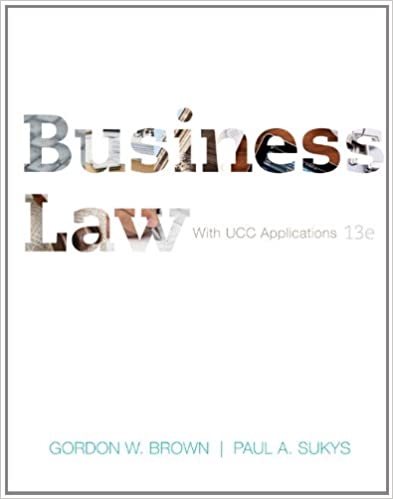
Business Law with UCC Applications 13th Edition by Gordon Brown,Paul Sukys
Edition 13ISBN: 978-0073524955
Business Law with UCC Applications 13th Edition by Gordon Brown,Paul Sukys
Edition 13ISBN: 978-0073524955 Exercise 4
Toward the end of the 18th century, the British legal system had begun to stagnate. This stagnation was reflected in the legal system's ill-advised over dependency on precedent. A Scottish philosopher named Jeremy Bentham suggested that the law could escape this unhealthy obsession with the past, if it adopted a more scientific approach to the lawmaking process. If the law simply promoted the greatest good for the greatest number of people, Bentham argued, then judges and members of Parliament would know exactly what to do when faced with a legal problem. In the day-to-day operation of the law, Bentham's plan would require lawmakers to consider the good and the bad effects of any legal proposal and then, after weighing those effects, determine the correct action. All of this sounds good in theory and it might even have worked, had it not been for a single fatal flaw, a flaw that had been anticipated a generation earlier by another philosopher, Adam Smith. In his famous work, The Wealth of Nations , Smith had considered an approach similar to Bentham's but rejected it as impractical for a simple reason. Human nature, Smith argued, led people to focus on their own self-interest rather than the interests of their fellow man. Self-interest, Smith realized, was the best way to build a legal system. Unfortunately, self-interest has a weakness too. Even when people are focused on self-interest, Smith noted, they rarely, if ever, comprehend what that self-interest ought to be. Ironically, if they actually understood what was in their own self-interest, they would frequently make decisions that promoted the best interests of the group, because, as Smith believed, these two things often went hand in hand. Interestingly enough for our purposes here, Smith targeted bankers as a classic example of a group of men who never really understood what was in their own self-interest and, as a result, frequently sabotaged their own industry. At one point Smith wrote, "Had every particular banking company always understood and attended to its own particular interest, the circulation never could have been overstocked with paper money. But every particular banking company has not always understood or attended to its own particular interest." Does this tendency to focus on self-interest still plague the banking industry or have bankers learned something over the last two centuries? As an experiment, answer that question now and then see if the chapter either changes your mind or confirms your answer. [See J. Bronowski and Bruce Mazlish , The Western Intellectual Tradition (New York: Harper Perennial, 1960), pp. 336-356, 436-449.]
Has government regulation done anything to improve the bank-depositor relationship? Explain.
Has government regulation done anything to improve the bank-depositor relationship? Explain.
Explanation
The government has established apex bank...
Business Law with UCC Applications 13th Edition by Gordon Brown,Paul Sukys
Why don’t you like this exercise?
Other Minimum 8 character and maximum 255 character
Character 255


